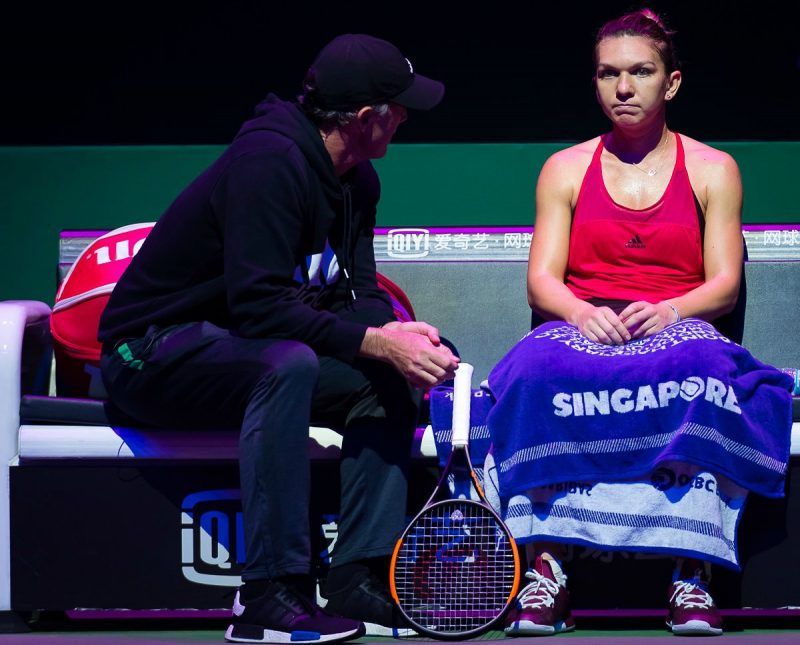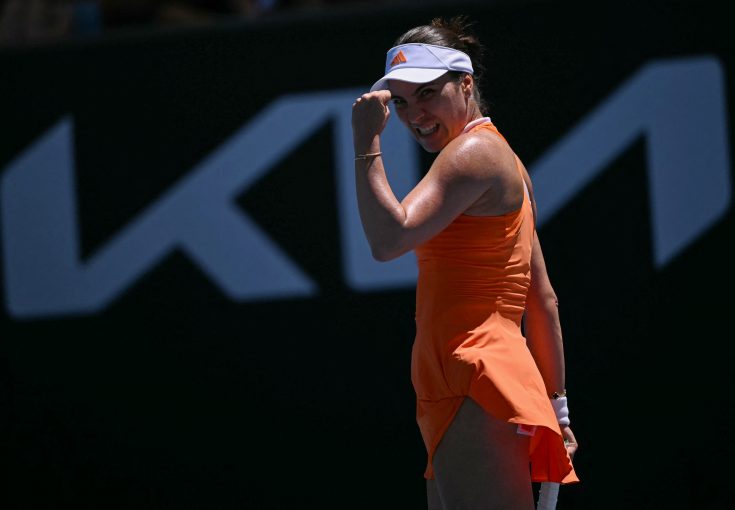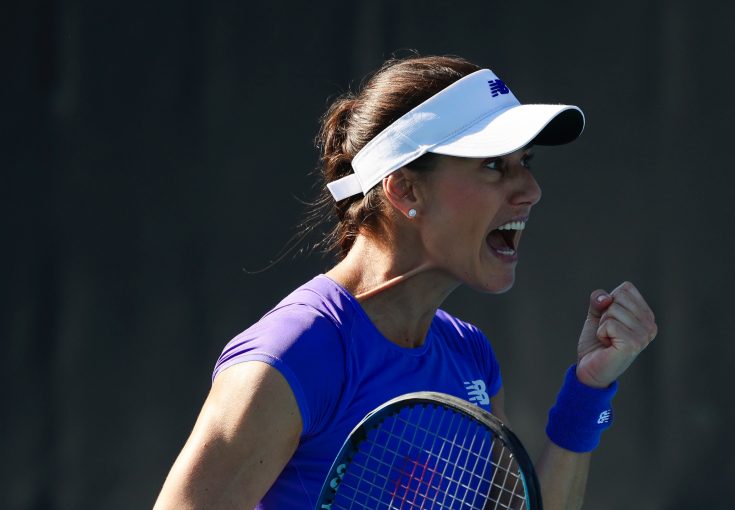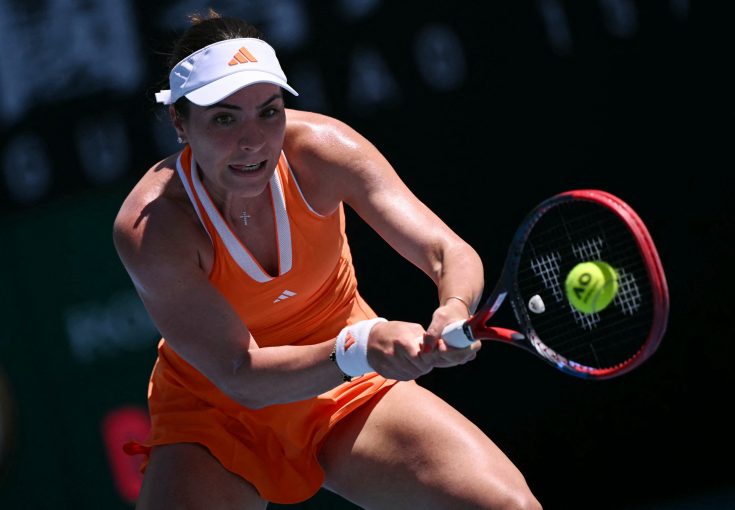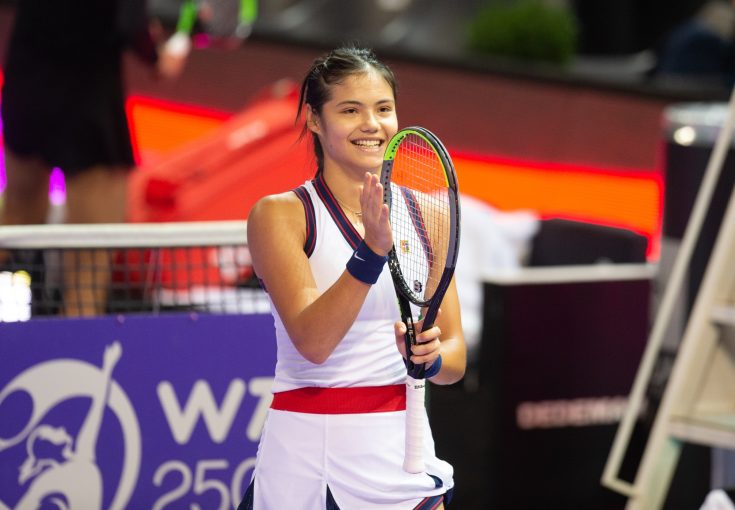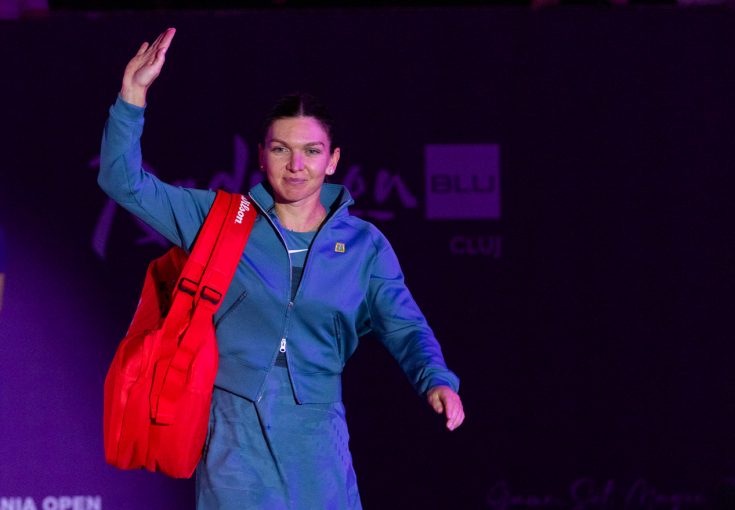Darren Cahill did not just coach Simona Halep. He coached an entire country
Camelia Butuligă | 10 noiembrie 2018I’m a fan of on-court coaching. I know opinion is split and there is a fair number of fans, pundits and ex-players that say that OCCs rob tennis of its individual character, but for me, the WTA’s decision to introduce on-court coaching in 2009 was a winner. It makes the matches more dynamic, offers a unique window into how players are thinking and showcases coaches, who can often be fascinating people. It’s like introducing a new plot twist and a new character into a book: it’s exciting, shakes things up, keeps everyone on heir toes. And here’s another thing: OCCs can go beyond helping just the player. It can help anyone who is watching. In Darren Cahill’s case, it helped an entire country.
Last night, Darren Cahill took a one-year hiatus from coaching to spend more time with his family and kids, who are at an age when they need guidance.
In the last three years, Halep and Cahill’s relationship was one of the most successful on the women’s tour. In an age where the player-coach carousel moves at dizzying speeds, this partnership became a case study in growth and overcoming obstacles. Their match-up, to use a celebrated tennis term, was perfect: Cahill’s experience as a coach and communicator paired with Simona’s talent, stubbornness and inner fire. The results? Two consecutive year-end no 1 rankings, her first Slam title (at RG this year), another two Slam finals (RG 17, AO 18), 4 Premier Titles and 5 Premier finals. But more importantly, a new mentality, a fresh approach to winning or losing, a focus on the big picture and the process more than the immediate results. And along with Simona, we, the Romanian fans, got to witness it all in their OCCs.
OCCs can be entertaining for different reasons: insightful and motivational speeches, humour and moments of human connection but also meltdowns, stare-offs and heated arguments. It’s life on fast-forward. In Simona’s case, for a while, that life was hard. When Cahill came on board, she was an established top 10 player who had recently cracked the top 5. She was talented, driven, hardworking. What she struggled with was her self belief under pressure: she had a tendency to be too hard on herself, to get riled up after making easy mistakes and slip into downward spirals that resulted in painful losses. Cahill’s job was to stop that avalanche.
But how do you stop an avalanche without getting dragged into it? Once she got into one of her funks, it was like she got sucked into a black hole: nothing reached her anymore. In his latest interview for the WTA Insider podcast, Cahill spoke about this: „What drives her is what holds her back. That internal fire, that Romanian blood, that emotional person that is incredibly impatient. (…) We worked really hard on realizing you never try to be perfect on the tennis court, because you’re never going to get there. I want her to be the person that she is, but just to try to pull back and correct herself every now and then. Realize when she’s getting too emotional on court, okay, let it out, but get back to business. (…) Before, she would let points, games, even sets skip away from her pretty quickly. She doesn’t do that anymore.”
Simona is not the only one struggling with perfectionism and high standards. A lot of players are like that; tennis is a notoriously hard sport on the mind. You often see them muttering to themselves, screaming, ranting, breaking rackets. Pressure makes everyone crazy, but some are better at handling it, especially if they were trained properly from an early age, in an environment that knew how to nurture talent without crushing it or coddling it. In Romania, unfortunately, that kind of environment is rare, on and off the tennis court.
When I play tennis nowadays, I often get to see kids practicing on the other courts. What astounds me is the amount of yelling that goes on – apparently, a requirement for Romanian tennis coaches is operatic pipes, along with tennis skills. Feedback is shouted from the back of the court, constantly, while playing. The content is appallingly limited, the same three or four pieces of advice I was given decades ago when I took up tennis: „Move your feet!”, „Bend your knees!”, „Go towards the ball!”.
One time, after an extremely annoying hour playing next to such racket (ha), I approached the tennis coach (who I happened to know) and asked him why he kept yelling. „What do you mean why? Did you see how bad he was playing?” Yes, I had. The poor kid became more and more dejected as time passed – by the end of the session he could barely drag his feet. The coach, unfortunately, did not see any connection between the kid’s level and his methods. So I employed a practical point of view, being that athletes are by definition practical people. „All right, so you yelled your head off for one hour. Did it look like it helped his playing in any way?” He stared at me for a few seconds like it was the first time he was thinking about this.
But knowing what I know about my country and Simona’s problems on the court, no toolbox, no mater how sophisticated technically and tactically, is going to be enough without self-awareness, especially when the going gets tough.
This, of course, is an extreme example of a common phenomenon in Romania: good intentions paired with limited psychological know-how. I have seen my fair share of coaching in this country: I played tennis as a kid, I have spoken to people who played other sports competitively, I have watched a lot of sports on TV, I have documented and read interviews and stories. It seems that during communism, the coaching philosophy was based on a heavy-handed approach where fear was the main motivator and the echoes of those times still linger today. „It’s my way or the highway. If you don’t do as I say, you’re going home,” I’ve recently heard a grumpy tennis coach say to his group just because the kids were joking around and took too long to pick up the balls. A friend who was on the national judo team during the late 80’s and early 90’s confessed he was shocked when they traveled to Italy or France and saw their practices: „It was so quiet. Nobody raised their voice! I thought, huh, is this possible?”
I am not saying that all coaches are ill-tempered tyrants. In my short tennis career I had three coaches and none of them were yellers. They were hardworking people who spent their days on the court and taught thousands of kids. They taught me how to correctly hit forehands and backhands and serves, how to be disciplined and work hard. But, and it’s a big „but”, they didn’t say too much about what to do in a match when my forehand or backhand or serve were not working.
Simona has spoken fondly about her coaches growing up, and I am sure they, like my own coaches, were competent, hard-working people. I have heard countless ex-player commentators praising Simona on her flawless technique: this can only be the result of that excellent early coaching that gave her a sophisticated toolbox to use during matches. But knowing what I know about my country and Simona’s problems on the court, no toolbox, no mater how sophisticated technically and tactically, is going to be enough without self-awareness, especially when the going gets tough.
Things have started to change. The younger generations of Romanian coaches coming up now, especially the ones who played or trained abroad, seem to employ more nuanced and sophisticated techniques. But this country is still made up of millions of people who went through their formative years during a totalitarian regime, when this forceful, all-or-nothing approach of teaching kids was the norm not only in sports, but in schools and families too. It still is, to a certain degree, because those kids are now parents or teachers or coaches. Many of them have remained, without realizing, prisoners to a set of beliefs that doesn’t serve them. It never served anyone, really.
And still, the Romanian school curriculum remains difficult, too theoretical and obsolete. Most teachers are underpaid, poorly trained pedagogically and unmotivated. Kids are either overwhelmed or disinterested, because nobody teaches them the most important skills in life: how to have an accurate image of their abilities and how to overcome failure. It’s what the whole country still struggles with. It’s what Simona struggled with.
Romanians are, for the most part, an ingenious, curious, resourceful people. They want the best for their country and kids, they want a good life, they want to be successful and most of them are willing to work hard for it. But they just don’t know how to get to the finish line. They have a tendency to either underestimate or overestimate themselves, they are quick to judge, both others and themselves. They jump to conclusions, they don’t know how to pace themselves and they give up too quickly.
Most of us badly need good coaching and that’s why most Romanian tennis fans watched with rapt attention Cahill’s OCCs: Simona’s problems were the same as ours. „What did Darren say?” became a sort of catchphrase among Romanian tennis fans. The Romanian television that has the rights for the WTA tour played the OCCs during the news, complete with Romanian subtitles. On Twitter and on forums, fans were dissecting his words. The whole tennis watching country was taking notes.
Photo credit: Jimmie48Photography
Cahill had to use a wide array of tactics: sometimes levelheaded calm and sound tactical advice worked. If Simona was unhappy with her mistakes, he pointed out what she had done well. If she was so furious she couldn’t even hear him, he kept repeating the same thing, broken-record style, until she made eye contact. Then, she got too reliant on him, called him on court too often. They had to fix that too, because OCCs are not allowed during Slams, and that was what she was after.
We saw Cahill employing all sorts of approaches, from big-picture wisdom to matter-of-fact tips, from pep talks to tough love. And the toughest moment in their relationship came after *that* OCC from Miami 2017, when Cahill removed himself from the job until Simona took steps to change her mentality. That was a shock tactic that worked: Simona was shocked and took those steps. She sought professional help and worked on her attitude and mentality. Cahill came back and they resumed their partnership.
Was it smooth sailing from then on? Not always. 2017 and the beginning of 2018 were brutal, so close and yet so far. That Roland Garros final, those matches with a chance at No.1, that first round exit from the USO 17, that Australian Open final: Romanian fans were put through the wringer. We had two options: throw our hands up in despair and bemoan our fate, decide we are cursed and give up. We are too small, history has screwed us over again, we are unlucky, etc. Or, we could soldier on, „working and believing”. Believing she would succeed in getting a Slam like we would succeed in getting whatever we were after in our lives: a PhD, writing a quartet or going to bed earlier.
At times, it was unbearable to watch her get so close and fail. A lot of people got angry, others gave up on her. We don’t need this kind of pain, we said. But however tempting that was, it was even more tempting to find out what Cahill had to say. Blame it on our curiosity and that nagging feeling that, maybe, maybe, this guy was on to something. So we decided to go along. Believe in ourselves, not give up. Because we were so close.
With Cahill’s words playing in the background, Simona got her Slam and her number 1 rank. Together with her, a lot of Romanians got their own personal victories. They have learned to consider the big picture, not jump to conclusions, and soldier on when things are not going well. Maybe they will take all these and apply them not only to their personal life, but to their community, as well. A lot of them are young people who are in school now, but in a few years they will start to make a difference in the world.
Maybe Romanians will have a better country because of this strange new philosophy based on tenacity and hope that an Australian introduced them to while he coached a short, stubborn Romanian girl to tennis greatness.
30-0: Are you aware of the huge popularity you have among Romanian fans? You are also a life-coach for them, a little bit.
Darren Cahill: Hahaha, you have to tell Simona that and then maybe she will listen to me a little more! (that is a joke!) I love you guys. As I said, you’re very similar to the Aussies and I always enjoy my time in Romania. A great country with great people and plenty of energy.
(From: Simona’s First Slam. The Story)
Recommended:
IBAN RO51RNCB0079145659320001
Asociația Lideri în Mișcare,
Banca Comercială Română
